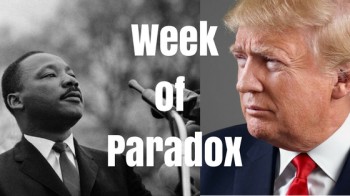Week of Paradox: Martin Luther King Day to Inauguration of President Elect Trump

By Marcy Mistrett, CEO
The week of January 15, 2017 is one book-ended by two events of national importance that, juxtaposed, provide us an opportunity to re-evaluate and recommit to our values and beliefs as a country and to our children. Monday, we celebrated Reverend Dr. Martin Luther King’s birthday – a day marked with our country’s values of hope, inclusion, justice and freedom. By Friday, we welcome in President-Elect Trump, who won his election based on values of fear, bigotry, and exclusion. Yet, what state campaigns that fight for the removal of youth from the adult court can verify, is that in providing a clear roadmap toward justice, we can overcome fear, bridge this paradox and become stronger together.
Thirty–four years ago, President Ronald Reagan passed the federal holiday in honor of Reverend Dr. Martin Luther King, Jr. When the law was enacted, the federal government was joined by only half the states in recognizing King as a national hero. South Carolina was the last state to recognize the holiday in 2000, but we are now a country that embraces the third Monday in January as a “Day On, Not a Day Off”—honoring the civil rights leader who fought to give our country a dream of civil rights, racial justice and harmony.
The path it took to get this great man honored as a national hero is “mired in racism, politics and conspiracy”, according to Time Magazine. And, following a week where the confirmation hearing of the next Attorney General was peppered with racism; when politics dismantled the Affordable Care Act; and when conspiracy against Russian interference in our free and open elections, I can’t think of a more important year to stand up and serve.
It’s important to remember that MLK Day did not happen overnight. It required organizing, petitions, testimony, failed bills, civil engagement and a narrative shift. Indeed, while labor organizers started fighting for recognition of the day in states soon after Dr. King was assassinated, the first federal bill didn’t get introduced until 1979. It took another 4 years to pass it, 3 more years to implement it; and 14 additional years to have it pass in every state. Even today, we have states that share Dr. King’s holiday with other leaders (such as General Robert E. Lee), who fought for very different values than those espoused by King. That said, it bears note that at the end of the day, this country chose JUSTICE, regardless of where we live on the map, or what political party we espoused. Dr. King is now an embraced part of our common history and values, and sits proudly carved into 30 feet of marble on our nation’s National Mall.
State campaigns fighting for the removal of youth from adult court understand the tenants of a similar struggle. In the 1990’s, nearly every state in the country redefined childhood and made it easier to drive children into the adult criminal justice system. It was accepted as truth by many that young people could be held to the same legal threshold as adults; a practice that fed mass incarceration, led the U.S. to be an international outlier, and sentenced a younger generation to the indelible stain of an adult conviction. But, those who were impacted, their families, and their communities believed in another way; they believed in justice. So with scant resources, and big stakes, they organized. They signed petitions and introduced bills, they analyzed data and asked hard questions, they told their stories and shifted the narrative, they challenged hate with love, and faced fear with courage. So this MLK Day, I stand with the families who launched a movement, such as Grace Warren (may she rest in peace) and Tracy McClard; Dwayne Betts and Marcus Bullock; Angel Sanchez and Angie Geyser; Jennifer Hoff and Susannah Marino; Hernan Cervantes and Jabreira Handy; Michael Kemp and Juan Peterson; Daniel Mendoza and James Anderson; Grace Bauer and Veronica Williams; Keela Hailes and Gina Womack.
And as they led and we stood…the laws and the narrative began to change; and children began to reclaim their childhood. Youth incarceration in adult prisons has dropped nearly 70% since the 1990s; we have the fewest states since the establishment of juvenile court that set the age of criminal responsibility below 18; reform is firmly a bipartisan issue; and the questions have become about the “how” and not “why”.
The movement is not yet over. We still have children as young as 11 and 12 going to adult court; racial and ethnic disparities are severe and growing; and not enough community-based alternatives exist to create a pathway home for these children. But, as the good Dr. King showed us, if you start with positive values, in the end justice will prevail.

